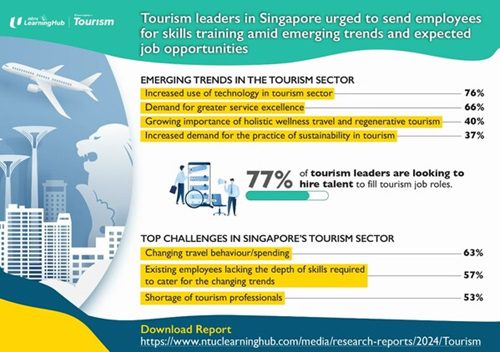![]() In the heart of Southeast Asia, Singapore’s tourism sector stands on the cusp of a significant transformation. With the global landscape of travel undergoing rapid changes, the city-state is poised to redefine the future of tourism through a strategic focus on skills development and embracing emerging trends. This strategic pivot aims to rejuvenate the sector post-pandemic and ensure its sustainable growth and competitiveness on the international stage.
In the heart of Southeast Asia, Singapore’s tourism sector stands on the cusp of a significant transformation. With the global landscape of travel undergoing rapid changes, the city-state is poised to redefine the future of tourism through a strategic focus on skills development and embracing emerging trends. This strategic pivot aims to rejuvenate the sector post-pandemic and ensure its sustainable growth and competitiveness on the international stage.
The pressing need for this shift has been underscored by a comprehensive Industry Insights Report 2024 on Tourism released by NTUC LearningHub. The report, drawing on insights from 167 business leaders and interviews with experts from pivotal institutions such as the Singapore Tourism Board, Workforce Singapore, and Resorts World Sentosa, sheds light on the sector’s crucial challenges and opportunities.
A significant finding of the report highlights a disconnect between the sector’s growth potential and the readiness of its workforce. While changing travel behaviours and spending patterns pose a challenge for 63% of tourism leaders, a concerning 57% note that existing employees lack the depth of skills required to navigate these changes effectively. Furthermore, a notable shortage of tourism professionals is acknowledged by 53% of the leaders surveyed.
Despite these challenges, the report reveals a hesitancy among sector leaders to commit to the necessary skills training. Less than half (48%) have already taken steps to send their employees for tourism-related training, with nearly three in ten (29%) planning to do so in the foreseeable future. Alarmingly, over one in five (23%) has no intention of pursuing training initiatives at all.
Emerging trends such as the increased use of technology in tourism (76%), a demand for more outstanding service excellence (66%), and a growing focus on holistic wellness travel and regenerative tourism (40%) present both challenges and opportunities. These trends and rising consumer demand for sustainable tourism practices (37%) underscore the urgent need for a skilled workforce to drive innovation and meet evolving customer expectations.
The report is optimistic about the sector’s potential for job creation, with nearly all tourism leaders (94%) agreeing that these emerging trends could foster new job opportunities. This optimism is matched by a solid intent to hire, with 77% of leaders looking to fill various roles, from marketing communications officers to event managers and administrative staff.
Central to this transformative vision is the call to action by Mr. Tay Ee Learn, Chief Sector Skills Officer at NTUC LearningHub. He emphasizes the critical importance of aligning business strategies with emerging trends, urging tourism organisations to focus on filling job roles and skill upgrading. “In this dynamic landscape, tourism organisations must embrace transformation… By identifying skills gaps in the current workforce, communicating the urgency of upskilling and reskilling to employees, and providing readily available training opportunities, organisations can cultivate a conducive environment for continuous learning and development,” says Mr Tay.
The report further explores the current adoption of technologies such as contactless payment options, AI chatbots, and big data analytics, highlighting leaders’ keen interest in enhancing their employees’ digital and technological capabilities. Additionally, there’s a strong consensus on the need to upskill in service engagement, sustainability, and holistic wellness travel to enhance service experience and meet the sector’s sustainability goals.
As the sector looks to incorporate sustainability in its offerings, with measures ranging from energy conversion to sustainable waste management, the report reveals a gap in familiarity and adoption of holistic wellness and regenerative tourism concepts. Yet, the overwhelming agreement on their importance for Singapore’s tourism future is a positive sign of the sector’s readiness to embrace change.
In conclusion, the Industry Insights Report 2024 paints a picture of a sector at a crossroads, with the path forward clear: embrace change, invest in skills development, and align with emerging trends. As Singapore’s tourism sector looks to the future, the message is clear – the time for action is now. For those interested in delving deeper into the report or exploring training opportunities, further information is available at NTUC LearningHub’s official website.
Written by: My Thanh Pham
















